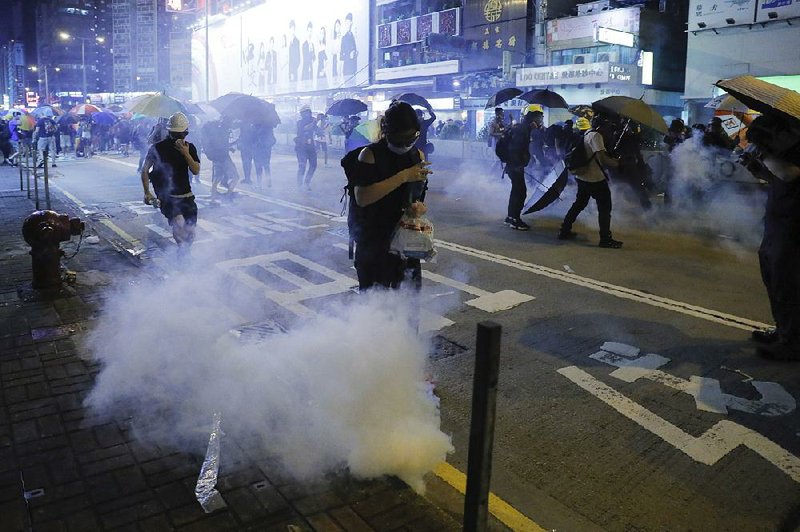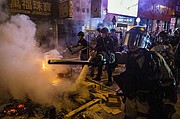HONG KONG -- Hong Kong protesters besieged a police station and a subway stop Friday, prompting police to fire tear gas and rubber bullets as new violence broke out despite the government's promise to drop a proposed law that sparked months of demonstrations in the semiautonomous Chinese territory.
About 2,000 angry protesters surrounded the police station in the crowded, working-class district of Mong Kok late Friday for a second-straight night, demanding accountability over a violent police raid on the nearby Prince Edward subway station on Aug. 31.
Police set up barriers at the entrance of the police station and later fired tear gas and rubber bullets to ward off the crowd, many of whom wore masks and used umbrellas to shield themselves.
Rumors have been circulating on social media accusing police of covering up the death of a protester during the earlier raid at the subway station. Videos taken then show police swinging batons and shooting pepper spray at people inside a stopped train. Protesters want surveillance camera recordings of the raid to be released to determine the truth.
The demonstrators retreated but refused to leave after riot police confronted them with more tear gas. Some protesters set off street fires with piles of carton boxes while others used sticks and metal rods to smash traffic lights and the metal roofing at another subway stop.
Earlier, authorities were forced to shut the Prince Edward subway station during the evening rush hour after demonstrators protested there against the alleged police violence.
Separately, more than 1,000 people gathered Friday night at a public park near Hong Kong's legislative complex, chanting "Fight for freedom." Medical workers rallied earlier at the office of the hospital authority.
Hong Kong leader Carrie Lam announced two days ago that her government will formally withdraw an extradition bill that would have allowed Hong Kong residents to be sent to mainland China for trial. Many saw it as a glaring example of the city's eroding autonomy since the former British colony returned to Chinese control in 1997.
The protest movement was triggered by the extradition bill, but the focus has since shifted to allegations of excessive use of force by police in the increasingly violent clashes and to other issues.
Protesters have adopted a new slogan, "Five key demands, not one less." They want an independent investigation into the allegations of police brutality, the unconditional release of those detained, no more labeling of the protests as riots and direct elections of the city's leaders.
Lam has rejected those demands, saying a police watchdog agency investigating police misconduct was credible. Critics say the agency is led by her allies and doesn't have the power to summon witnesses.
Police say they have used the minimum amount of force necessary to quell riotous demonstrations. The city is bracing for more protests over the weekend, including plans to target the airport again today.
Early Friday, students in blue school dresses and surgical masks like those worn by protesters held hands in a human chain outside the Maryknoll Convent School, a Catholic girls' school. People from other schools, including graduates clad in the protesters' trademark black, also joined similar chains.
The unrest led ratings agency Fitch to cut Hong Kong's credit rating on Friday, saying the turbulence has "inflicted long-lasting damage" to the territory's image and that a degree of public discontent is likely to persist.
Fitch also cited Hong Kong's growing integration with the mainland, saying that could erode its autonomy under the "one country, two systems" framework under which it returned to Chinese rule.
Lam, who is in southern China for a visit, disputed the downgrade.
"We do not agree with Fitch Rating's decision because based on what happened in the past months, nothing has undermined the 'one country, two systems,'" she said.
In Beijing, visiting German Chancellor Angela Merkel called Friday for the rights and freedoms of Hong Kong residents to be protected. Merkel, who met with Chinese President Xi Jinping and Premier Li Keqiang, said political dialogue -- not violence -- was the path toward a resolution.
A Section on 09/07/2019

